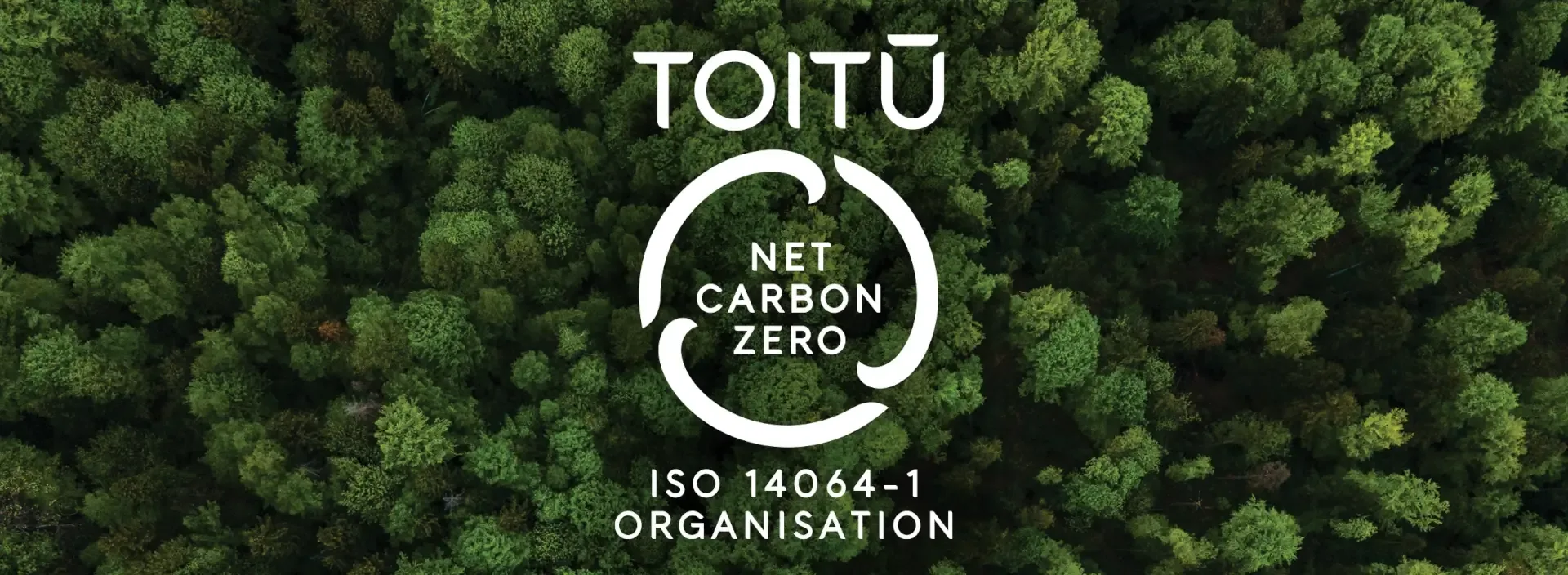
We're thrilled to announce that Kale Print has officially become a Toitū Carbonzero certified organisation in line with ISO 14064-1
This achievement marks another pivotal moment in our journey, showcasing our dedication to responsible business practices, sustainability and our commitment to meeting the highest social and environmental standards.
As a family business that has been operating for more than 35 years, we firmly believe it is the responsibility of each generation to leave things in better shape for the generation that follows.
Toitū Envirocare provided all the tools we needed to start our carbon reduction journey including tailored software and technical guidance through to independent audit and third-party certification.
This is the second year of reporting under the Toitū net carbonzero programme. An absolute reduction in Category 1 and 2 emissions of 8.41 tCO2e has been achieved against base year. A reduction in emissions intensity (for Category 1, 2 and mandatory Category 3 and 4 emissions) of 0.69 tCO2e/$M has been achieved based upon a 2-year rolling average, adjusted for inflation.
During the reporting period Kale Print increased its revenue by 27% and its full time employees (FTE) by 31%.
During the reporting period our emissions per FTE decreased from 2.3 (tC02e) to 1.90 (tC02e), a reduction of 21%.
2022 Baseline 80.73/ 35 FTE = 2.30 (tCO2e) per employee
2023 Report Period 87.53 / 46 FTE = 1.90 (tCO2e) per employee.
Kale Print Limited is committed to doing no harm while working on reducing emissions. Accordingly, we have offset our unavoidable emissions by investing in carbon credit projects to compensate for the Toitū mandatory emissions resulting from our operations this year.
More than 50% of our investment is supporting the Spray Point Native Forest Regeneration site located in Marlborough New Zealand. The remaining investing is supporting high quality international projects such as solar energy production to reduce fossil fuel and clean water programmes.
At Kale Print, we are committed to managing and reducing our emissions. Our commitments, including GHG emissions reduction targets and plans, have been reviewed and are in line with Toitū net carbonzero programme requirements.
Our goals are linked to our company vision of reducing our CO2 emissions beyond neutrality.
Carbon Credit Projects - New Zealand:

Spraypoint - New Zealand Native Forest Project
Spraypoint is a native forest regeneration site located in Marlborough, New Zealand. The carbon forest area is under a QEII covenant, and consists of diverse range of vegetation, including a threatened species of broom. The site provides a breeding area for the New Zealand Falcon.
Co-benefits: watershed protection and quality, erosion control, biodiversity, conservation.
Carbon Credit Projects - International:

Aqua Clara Water Filters, Kenya
Fewer than half of Kenyans have access to safe drinking water, collecting water from open rivers, streams and other unsafe sources, leading to regular outbreaks of cholera and other water-borne diseases.
People are encouraged to boil water before drinking, which is usually done by burning unsustainable sources of biomass like wood or charcoal, reducing forest cover, causing carbon emissions, and exposing people to household smoke.
This project brings affordable water filters to families and schools in Kenya, through community-led microfinance loans, eliminating the need to boil water for drinking. These bio-sand water filters purify water as it passes through layers of sand, naturally removing bacteria and parasites from the clean water that flows from the tap. Hence, emissions are avoided by switching from boiling the water, to using the water filters.
Aqua Clara goes beyond providing the technology for safe water, they also teach people how to maintain the bio-sand filters and educate communities on the importance of washing hands, fruits and vegetables.

ORB Household Solar, India
Dissemination of solar thermal (water heating) and electrical (lighting and other needs) systems in rural and urban/semi-urban areas in Karnataka, India. This will use energy from the sun and convert it into thermal and electrical energy respectively to replace the fossil fuel that would have been used otherwise to meet equivalent energy demands in the baseline.
The households/SMEs in India meet their energy needs from grid electricity, kerosene, LPG, diesel and wood (non-renewable) which are used as energy sources for electrical and thermal energy needs. The energy baseline is the fossil/non-renewable fuel consumption that would have been used in the absence of the project activity to generate the equivalent amount of energy needed for electric and thermal applications per household/facility. Thus, replacement of fossil fuel usage will contribute towards reducing equivalent greenhouse gas emissions.




